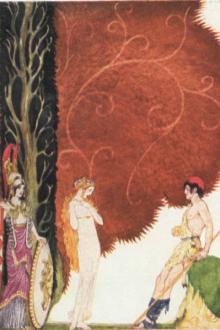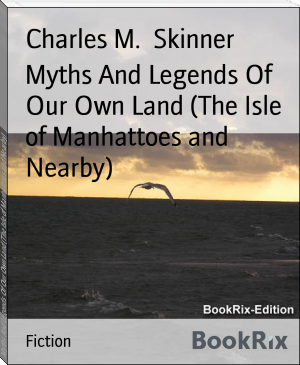The Adventures of Odysseus and The Tales of Troy - Padraic Colum (i read books .txt) 📗

- Author: Padraic Colum
- Performer: -
Book online «The Adventures of Odysseus and The Tales of Troy - Padraic Colum (i read books .txt) 📗». Author Padraic Colum
'I told my companions what Circe had told me about the Sirens in their field of flowers. I took a great piece of wax and broke it and kneaded it until it was soft. Then I covered the ears of my men, and they bound me upright to the mast of the ship. The wind dropped and the sea became calm as though a god had stilled the waters. My company took their oars and pulled away. When the ship was within a man's shout from the land we had come near the Sirens espied us and raised their song.'
'"Come hither, come hither, O Odysseus," the Sirens sang, "stay thy bark and listen to our song. None hath ever gone this way in his ship until he hath heard from our own lips the voice sweet as a honeycomb, and hath joy of it, and gone on his way a wiser man. We know all things—all the travail the Greeks had in the war of Troy, and we know all that hereafter shall be upon the earth. Odysseus, Odysseus, come to our field of flowers, and hear the song that we shall sing to thee."'
'My heart was mad to listen to the Sirens. I nodded my head to the company commanding them to unloose me, but they bound me the tighter, and bent to their oars and rowed on. When we had gone past the place of the Sirens the men took the wax from off their ears and loosed me from the mast.'
ut no sooner had we passed the Island than I saw smoke arising and heard the roaring of the sea. My company threw down their oars in terror. I went amongst them to hearten them, and I made them remember how, by my device, we had escaped from the Cave of the Cyclops.
I told them nothing of the monster Scylla, lest the fear of her should break their hearts. And now we began to drive through that narrow strait. On one side was Scylla and on the other Charybdis. Fear gripped the men when they saw Charybdis gulping down the sea. But as we drove by, the monster Scylla seized six of my company—the hardiest of the men who were with me. As they were lifted up in the mouths of her six heads they called to me in their agony. 'But I could do nothing to aid them. They were carried up to be devoured in the monster's den. Of all the sights I have seen on the ways of the water, that sight was the most pitiful.'
'Having passed the rocks of Scylla and Charybdis we came to the Island of Thrinacia. While we were yet on the ship I heard the lowing of the Cattle of the Sun. I spoke to my company and told them that we should drive past that Island and not venture to go upon it.'
'The hearts of my men were broken within them at that sentence, and Eurylochus answered me, speaking sadly.'
'"It is easy for thee, O Odysseus, to speak like that, for thou art never weary, and thou hast strength beyond measure. But is thy heart, too, of iron that thou wilt not suffer thy companions to set foot upon shore where they may rest themselves from the sea and prepare their supper at their ease?"'
'So Eurylochus spoke and the rest of the company joined in what he said. Their force was greater than mine. Then said I, "Swear to me a mighty oath, one and all of you, that if we go upon this Island none of you will slay the cattle out of any herd."'
'They swore the oath that I gave them. We brought our ship to a harbour, and landed near a spring of fresh water, and the men got their supper ready. Having eaten their supper they fell to weeping for they thought upon their comrades that Scylla had devoured. Then they slept.'
'The dawn came, but we found that we could not take our ship out of the harbour, for the North Wind and the East Wind blew a hurricane. So we stayed upon the Island and the days and the weeks went by. When the corn we had brought in the ship was all eaten the men went through the island fishing and hunting. Little they got to stay their hunger.'
'One day while I slept, Eurylochus gave the men a most evil counsel. "Every death," he said, "is hateful to man, but death by hunger is far the worst. Rather than die of hunger let us drive off the best cattle from the herds of the Sun. Then, if the gods would wreck us on the sea for the deed, let them do it. I would rather perish on the waves than die in the pangs of hunger."'
'So he spoke, and the rest of the men approved of what he said. They slaughtered them and roasted their flesh. It was then that I awakened from my sleep. As I came down to the ship the smell of the roasting flesh came to me. Then I knew that a terrible deed had been committed and that a dreadful thing would befall all of us.'
'For six days my company feasted on the best of the cattle. On the seventh day the winds ceased to blow. Then we went to the ship and set up the mast and the sails and fared out again on the deep.'
'But, having left that island, no other land appeared, and only sky and sea were to be seen. A cloud stayed always above our ship and beneath that cloud the sea was darkened. The West Wind came in a rush, and the mast broke, and, in breaking, struck off the head of the pilot, and he fell straight down into the sea. A thunderbolt struck the ship and the men were swept from the deck. Never a man of my company did I see again.'
'The West Wind ceased to blow but the South Wind came and it drove the ship back on its course. It rushed towards the terrible rocks of Scylla and Charybdis. All night long I was borne on, and, at the rising of the sun? I found myself near Charybdis. My ship was sucked down. But I caught the branches of the fig tree that grew out of the rock and hung to it like a bat. There I stayed until the timbers of my ship were cast up again by Charybdis. I dropped down on them. Sitting on the boards I rowed with my hands and passed the rock of Scylla without the monster seeing me.'
'Then for nine days I was borne along by the waves, and on the tenth day I came to Ogygia where the nymph Calypso dwells. She took me to her dwelling and treated me kindly. But why tell the remainder of my toils? To thee, O King, and to thy noble wife I told how I came from Calypso's Island, and I am not one to repeat a plain-told tale.'
VIIdysseus finished, and the company in the hall sat silent, like men enchanted. Then King Alcinous spoke and said, 'Never, as far as we Phæacians are concerned, wilt thou, Odysseus, be driven from thy homeward way. To-morrow we will give thee a ship and an escort, and we will land thee in Ithaka, thine own country.' The Princes, Captains and Councillors, marvelling that they had met the renowned Odysseus, went each to his own home. When the dawn had come, each carried down to the ship on which Odysseus was to sail, gifts for him.
When the sun was near its setting they all came back to the King's hall to take farewell of him. The King poured out a great bowl of wine as an offering to the gods. Then Odysseus rose up and placed in the Queen's hands a two-handled cup, and he said, 'Farewell to thee, O Queen! Mayst thou long rejoice in thy house and thy children, and in thy husband, Alcinous, the renowned King.'
He passed over the threshold of the King's house, and he went down to the ship. He went aboard and lay down on the deck on a sheet and rug that had been spread for him. Straightway the mariners took to their oars, and hoisted their sails, and the ship sped on like a strong sea-bird. Odysseus slept. And lightly the ship sped on, bearing that man who had suffered so much sorrow of heart in passing through wars of men and through troublous seas—the ship sped on, and he slept, and was forgetful of all he had passed through.
When the dawn came the ship was near to the Island of Ithaka. The mariners drove to a harbour near which there was a great cave. They ran the ship ashore and lifted out Odysseus, wrapped in the sheet and the rugs, and still sleeping. They left him on the sandy shore of his own land. Then they took the gifts which the King and Queen, the Princes, Captains and Councillors of the Phæacians had given him, and they set them by an olive tree, a little apart from the road, so that no wandering person might come upon them before Odysseus had awakened. Then they went back to their ship and departed from Ithaka for their own land.
Odysseus awakened on the beach of his own land. A mist lay over all, and he did not know what land he had come to. He thought that the Phæacians had left him forsaken on a strange shore. As he looked around him in his bewilderment he saw one who was like a King's son approaching.
Now the one who came near him was not a young man, but the goddess, Pallas Athene, who had made herself look like a young man. Odysseus arose, and questioned her as to the land he had come to. The goddess answered him and said, 'This is Ithaka, a land good for goats and cattle, a land of woods and wells,'
Even as she spoke she changed from the semblance of a young man and was seen by Odysseus as a woman tall and fair. 'Dost thou not know me, Pallas Athene, the daughter of Zeus, who has always helped thee?' the goddess said. 'I would have been more often by thy side, only I did not want to go openly against my brother, Poseidon, the god of the sea, whose son, Polyphemus, thou didst blind.'
As the goddess spoke the mist that lay on the land scattered and Odysseus saw that he was indeed in Ithaka, his own country—he knew the harbour and the cave, and the hill Neriton all covered with its forest. And knowing them he knelt down on the ground and kissed the earth of his country.
Then the goddess helped him to lay his goods within the cave—the gold and the bronze and the woven raiment that the Phæacians had given him. She made him sit beside her under the olive tree while she told him of the things that were happening in his house.
'There is trouble in thy halls, Odysseus,' she said, 'and it would be well for thee not to make thyself known for a time. Harden thy heart, that thou mayest endure for a while longer ill treatment at the hands of men.'





Comments (0)